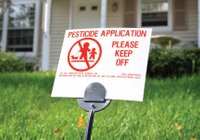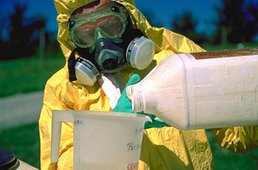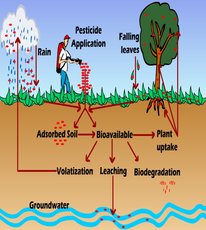Pesticides
Pesticides Facts
Pesticides, herbicides and fungicides are toxic by design. They are designed to kill, reduce or repel insects, weeds, rodents, fungi or other organisms. Regretfully there are chemicals that kill just one specific species. This holds true for organic pesticides and herbicides as well. Organic pesticides that target mosquitos or ticks, kill beneficial insects as well.

If you work with landscaping chemicals you should know:
- Almost all of the insects in the garden are beneficial, and essential for a healthy ecosystem.
- That more than 95% of an application will not touch its target, but will end up in non-targeted organisms, in the air and in our waterways.
- Insect populations have declined with more than 50%
most likely due to pesticide use.
- That most drinking water in the USA today contains pesticides.
- That most of our bee honey is comtaminated with pesticides.
- That pesticides create a cycle in which we need more pesticides, because, with the use of artificial pesticides, we have killed insects that provide natural pest control.
- That the use of pesticides leads to serious decrease of soil quality.
The Risk to Humans
The health risks of pesticide use are debated. Scientist argue on what should be considered safe or not. Here is what we know:
Long term pesticide exposure
A growing body of epidemiologic and animal data and research studies suggests a link between long-term pesticide exposure and:
- Abnormal growth and development
- Impaired neurobehavioral development / functions
Cancer, allergies, endocrine disruption.
- Reproduction and birth defects.
- Low sperm count and infertility.
- Early puberty.
- Testicular, breast, and prostate cancer.
- Altered sex ratio.
- Immunotoxicity.
- Increased susceptibility to infections.


Pesticides and Children
Children are especially at risk, due to their size and developing brain. How do children get in contact with pesticides?
- Insecticides may persist in house dust, in soil tracked in from outdoors. High levels of insecticides have been measured for weeks after professional application.
- Playgrounds, playing fields, lawns and gardens may be routinely sprayed in order to keep insects away.
- Pesticides are found in drinking water.
- Pesticides are found in recreational waters (lakes, rivers and in pools).
Healthy Yards don't need Pesticides
The simple fact is, if you plant plants, shrubs and trees in the right place you will not need pesticides. If pest investations are recurring you should question yourself why this plant or tree is so susceptable? Maybe it is time to replace that species with another one, that will do better in that area.
Visit our pages Planting and Reduce Lawns for more information about this topic.

Pesticides and Wildlife
Insects and wildlife can be impacted by pesticides through direct or indirect applications, such as pesticide drift, secondary poisoning, runoff into local water bodies, and groundwater contamination. It is possible that some animals could be sprayed directly, while others consume plants or prey that have been exposed to pesticides. Exposure to pesticides can also alter an organism’s behavior, impacting its ability to survive. Many deformations have been found after exposure to hormone-mimicking pesticides classified as endocrine disruptors. Reproductive abnormalities have been observed in mammals, birds, reptiles, fish, and mollusks at levels considered “safe” by the Environmental Protection Agency (EPA).
Learn More
